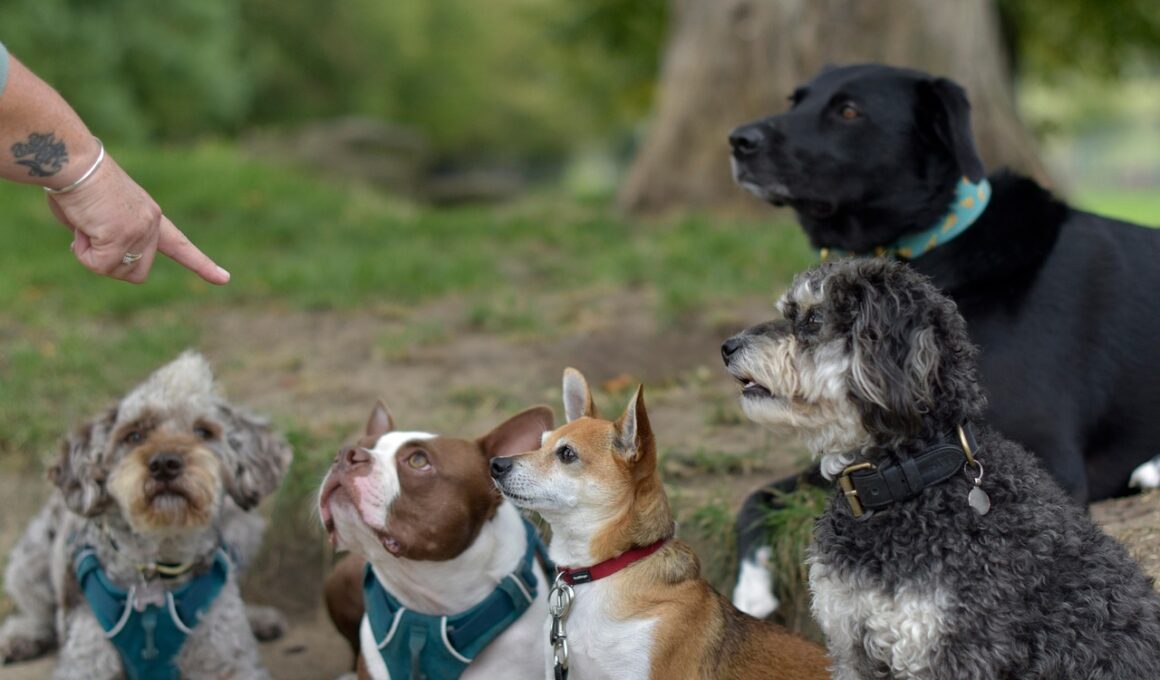How Group Training Sessions Foster Better Owner-Dog Relationships
Group training sessions play a pivotal role in enhancing the bond between dogs and their owners. By engaging in these classes together, owners learn valuable skills while fostering teamwork and trust with their pets. Every session provides a structured environment where dogs can learn basic commands, proper manners, and social behaviors through interactive activities. This not only strengthens the dog’s training but also deepens the connection with their owner. The shared experience of overcoming challenges together can significantly improve the overall relationship. Additional benefits include socialization skills for both dogs and owners, exposing them to a variety of different personalities in both humans and animals. When dogs interact positively in group settings, they become more adaptable and confident in their everyday lives. Furthermore, owners gain insights into their dog’s behavior and temperament, learning effective methods to manage challenging situations. Group training sessions also create a community of dog enthusiasts who share experiences, tips, and support. Such interactions help owners realize they are not alone in their journey, making the experience more enriching and enjoyable. Ultimately, these sessions lay a solid foundation for a harmonious owner-dog partnership.
As dogs participate in group training sessions, they encounter a controlled environment that encourages socialization with their peers. This vital interaction introduces your dog to various breeds and sizes, promoting good manners and enhancing their confidence. Over time, your dog learns to behave appropriately in the presence of others. The more dogs they interact with, the better their social skills become, making them likely to exhibit friendly behavior in public settings. Owners who witness this transformation become more adept at reading their dog’s mood and body language. This understanding reinforces mutual trust, reducing anxiety during novel situations. Group training also cultivates teamwork skills, as owners must effectively communicate with their dogs to achieve desirable results. By doing so, they build a stronger rapport, which is essential for obedience and responsiveness. The support from trainers and fellow dog owners further motivates participants to remain engaged and committed towards their goals. Adjustments and corrections offered during classes enhance the learning experience. Consequently, both dogs and owners grow together, sharing moments of triumph, laughter, and learning. This journey ultimately strengthens their emotional bond, ensuring a healthier and more enjoyable relationship.
Learning Essential Skills Together
Taking part in group training sessions provides opportunities for dogs and their owners to learn essential skills collaboratively. Training doesn’t just develop good behaviors; it promotes communication and connection. During these sessions, owners are taught methods to encourage desired behaviors through positive reinforcement. By consistently applying these techniques during training, owners can shape their dog’s behavior in a way that is both effective and encouraging. Moreover, as trainers guide sessions, they offer invaluable insights about the canine mind that enhance the overall learning experience. For instance, understanding how dogs perceive commands or the importance of rewards can radically improve training outcomes. Each successful task completed in the group adds to the owner-dog connection as they experience the joy of achieving milestones together. Shared accomplishments create emotional satisfaction and trust, which are essential for long-term compliance and companionship. That trust translates into more engagement in every aspect of the dog’s life, further enriching their bond. Consequently, both parties recognize the importance of working together to achieve a common goal. This understanding fosters an environment of continued learning and activity that benefits both dogs and their owners.
In group training settings, the dynamics among participants promote valuable insights that can directly enhance the owner-dog relationship. Observing other dogs and their owners can provide new strategies for problem-solving. Owners might see different techniques for a similar training challenge and adapt those to fit their unique situations. This collaboration forms a unique learning community that benefits all involved. Furthermore, cheering for one another’s successes fosters a supportive atmosphere that inspires ongoing engagement. This camaraderie allows owners to share their experiences and frustrations, reinforcing the bond between group members. It cultivates empathy and understanding that reflects back on their individual relationships with their pets. Celebrating successes as a group instills motivation and provides encouragement, further solidifying the perception of training as a positive experience. The social aspect of group training also reinforces a sense of accountability among owners. When other owners are working towards similar goals, participants may feel more inclined to uphold their commitment to training at home. This heightened motivation ensures lessons learned in class are practiced regularly at home, promoting consistency in commands and behaviors, leading to stronger bonds overall.
Strengthening Trust and Confidence
Building a solid foundation of trust is crucial in any owner-dog relationship. Group training fosters this trust by encouraging dogs to confront their fears in a manageable environment with guidance. A well-structured group setting allows dogs to experience various stimuli, helping them learn to cope with distractions. As dogs grow more confident through these interactions, owners witness remarkable shifts in behavior, tackling anxiety and aggression that can hinder positive experiences. Learning from both other dogs and their owners in a group fosters a sense of security. Dogs can observe their peers succeeding and learn that new experiences can be genuinely rewarding. This observation, coupled with positive reinforcement from their owners, creates an environment conducive to learning and growing. As confidence flourishes, the connection between owner and pet deepens. Dogs that feel secure are more likely to respond positively to their owners, whether in challenging situations or during everyday activities. Moreover, this improved trust leads to a greater willingness to explore the environment, further strengthening the relationship. Ultimately, group training enhances overall quality of life for both dogs and their owners.
The social interactions that occur during group training sessions cultivate not only essential skills but also emotional intelligence within both dogs and their owners. Dogs learn to read social cues, interpret body language, and engage positively with other dogs. Owners, in turn, gain a deeper understanding of their pets’ needs and emotions. As the bond grows from this shared learning process, both parties feel empowered and valued. This emotional connection influences everyday routines, making daily life more harmonious. The skills acquired in training sessions extend beyond the classroom into real-life situations. Owners can effectively manage their dog’s behavior in various environments, leading to more enjoyable outings. Greater emotional intelligence allows for enhanced communication, resulting in fewer misunderstandings. The application of empathy and appreciation in their relationship helps in addressing challenges more positively. This mutual understanding creates an enjoyable rapport that keeps both parties engaged and excited for their next training experience. Consistent training enables owners to reinforce positive behaviors and eliminate undesirable habits. The progress made during these sessions translates into a fulfilling partnership where both owner and dog feel secure, supported, and valued in one another’s lives.
A Journey of Growth
Participating in group training sessions is a transformative journey for both dogs and their owners. As they engage in challenges together, they uncover strengths and areas for growth, fostering resilience. Each training session serves as a stepping stone towards a deeper relationship that evokes shared goals and aspirations. Dog owners learn to appreciate the individuality of their pets, understanding that every dog operates differently. This recognition cultivates a greater sense of patience and compassion, leading to a more nurturing bond. As the relationship evolves, owners also develop skills to adapt their training approach to meet their dog’s unique needs. Sharing successes and challenges within a community creates a rich learning environment that nurtures personal growth. The ongoing connection strengthens as owners and dogs celebrate milestones together, creating lasting memories filled with joy and satisfaction. Encouraging dogs in group settings often leads to enhanced obedience and social skills that expand opportunities in various situations. Furthermore, this collaborative experience reinforces the importance of commitment, teamwork, and collaboration in ensuring a lasting and loving partnership. Through these shared experiences, owners and dogs establish an extraordinary connection that enhances the quality of life for everyone involved.
In conclusion, group training sessions are a vital element for fostering better relationships between dogs and their owners. Not only do they provide essential skills and strategies for managing behaviors, but they also create a supportive community that enriches the experience for everyone involved. Through consistent social interaction and shared learning, both dogs and their owners can thrive together. Dogs become better equipped to navigate their environment, while owners gain invaluable insights into their pet’s needs and emotions. The synergy that develops in group training ultimately brings to light the importance of trust, understanding, and communication in solidifying the bond. This engaging process creates a greater sense of belonging, which enhances overall happiness for both parties. The lessons learned extend far beyond the training sessions and lead to a more dynamic, fulfilling partnership. Regular participation illustrates the commitment to developing a well-rounded canine companion, reinforcing mutual respect and understanding. As owners invest time in group training, the emotional rewards transform their relationships into ones characterized by joy, companionship, and resilience. Truly, the journey through group training sessions leads to lasting bonds, revealing the wonderful connection that exists between dogs and their owners.


